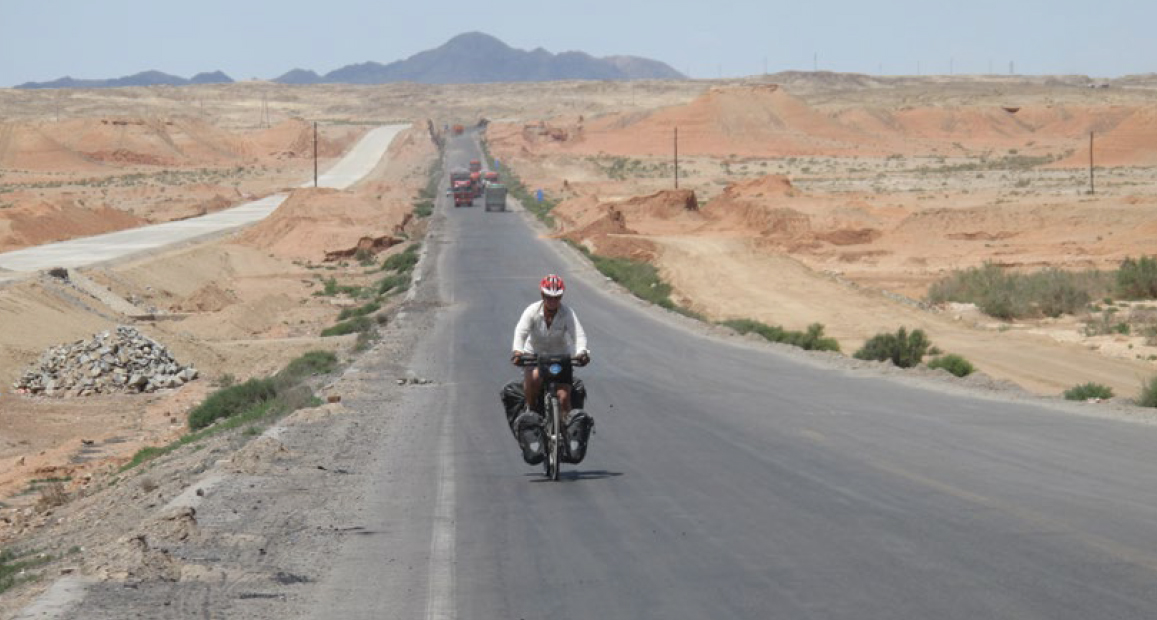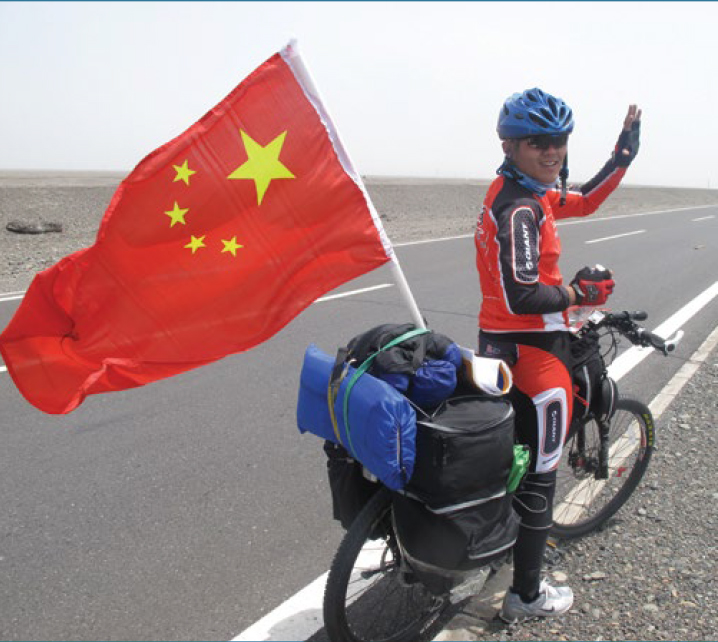I Am Happiness
I wiped sticky dust from my forehead with the back of my grubby hand and nibbled the arm of my sunglasses, my cleats tapping across the shiny floor of the gas station. It was breakfast time, and I was hungry. Chicken’s feet — no. Unidentified sausage imposters — no. Chili peas and something rice related — yes! Enjoying the half shiver brought on by the draft of air conditioning and the chance to stretch my tight calves with a walk meant that I was dawdling.
Every so often I threw my bike, Hercules, a glance. A young Chinese guy was standing with hands on hips looking at it, bending down to touch the pedals, running his hands along the squidgy leather wrap of the butterfly bars, nodding here and there. I wonder if he’s a cyclist, I thought, and returned to my breakfast options.
Turning to go after paying, I was met by the young bike admirer, who had come inside to find its owner. A mane of dark hair stood up a bit like a 1980s punk star, framing a nervous but smiling face. Hands on hips still, T-shirt sleeves rolled up (to show off his biceps, I presumed), he half-bowed and half-giggled a hello in Chinese and then English. “Uh, is that your bike outside?” he asked, eyebrows raised. “Wow! Cool,” he exclaimed as I nodded. The usual questions of where I had come from and where I was going followed, the answers punctuated with repeated gasps of incredulity and admiration.
“From London?” he asked, shaking his head in disbelief. “Wow! Uh, that’s a really long way!” I know, I thought, my butt hurts.

He nodded at me for a bit and in a slightly faltering way told me that he too wanted to ride a bike on an adventure one day. But Gao, as he’d just introduced himself, reckoned that he wasn’t strong enough and didn’t think that he could, that he would need to do much training and that he probably couldn’t afford it.
I reassured him that he could go right away if he wanted to. I knew that all he needed was to set out on a bike with a bag of a few things and that an adventure would happen. I recognized in Gao what I had recognized in others when wondering about their ability to ride a bike a long way. And in myself too — perhaps not in considering my ability to ride but in other projects. All those things that I wanted to do or to change, but allowed the voices in my head — or even outside of it — to get louder than I ought to have let them and talk me down from a plan or a goal.
“Really? You really think I could do it too?” There was a bashfulness about him, a grin of wide-eyed wonder from the rookie to my dusty, mile-worn self. As though perhaps I had given him permission to believe he could do it.
“Just get a bike and go! You’ll learn on the way,” I told him, handing him my email address and urging him to tell me about it one day. Gao grinned and bowed and we shook hands, parting ways.
As I swung my leg over Hercules, clipped into one pedal and pushed off, stuffing some food in my mouth as I did so, I wondered if I would ever hear from Gao again. Whether I did or not, I hoped he would go and ride somewhere and find the evolving magic of ever-changing horizons on the road.
I was in Xinjiang province, western China, having emerged sweaty and dusty from Kazakhstan a week before. Three months earlier, I had set off from London’s Tower Bridge, bound for the world. My plan was to loop the Northern Hemisphere, rowing the Pacific and Atlantic oceans — cycling across Eurasia and North America and kayaking the bits in between. I had kayaked from Tower Bridge, down the Thames, and across the English Channel to France with all the urgency of being 25 and standing at the foot of a 2.5-year journey, hungry for the miles to be chalked up against the overall route. I was heading out in search of adventure and all the learning and challenges that brings. I wanted my mind to be blown, my body to be tested, my brain to be filled with questions, and my perspectives changed. I wanted to meet people and wildlife, to see and feel landscapes and seascapes changing.
Looking back with the wisdom of almost a decade, I recognise that I was on the run too — from myself, and sort of in search of myself too. I had always been on the move, always striving. Ever since I was a young girl and saw my dad’s crippling arthritis strip from him all the things he loved to do and grind down his health, I had a sense of how lucky I was to be fit and strong. How I needed to make the most of that. How I needed to feel alive. At this time in my life, I needed to push myself onward and forward.
My dad died suddenly just after my 21st birthday. I had been in the middle of planning an ocean row so it felt natural to dedicate it to his memory and use it to chart my way through grief. That Indian Ocean row in 2009 had given me the inspiration to dream up this global trek and the courage to believe I could do it.
I had found flow in Kazakhstan. Under wide skies and during long summer days, fueled by bottomless pots of thick black tea bursting with sugar and the warmth and friendliness of people on the road, I rode across the empty steppe and reached that sweet spot of meditation. Bike and legs were in motion, becoming each other somehow. The desert joined in, dust everywhere.
There was still pressure to reach the far eastern coast of the continent before winter arrived, but I had my rhythm and my legs were strong. Right now I was focused on Ürümqi, the next major city a day’s ride away.
A car honked as it flew past on the opposite side of the road, and I looked over. Gao was hanging out of the window, waving madly. Stopping ahead of me, he jumped out of the car and ran across the road to meet me.
“Sarah, Sarah! I want to come with you. I want to ride to Beijing!” he declared. He had certainly surprised me and earned my respect. I’m not sure I would have been that brave.
My first thoughts were about how to put him off, fears making noises in my head. What if he slows me down? What if he dies in the Gobi Desert?
Meanwhile Gao had pulled out the road atlas and was pointing out the places we might visit, spots where he had friends on our route.
My “I ride quite far every day” was met with “Yeah, sure, no problem” and a declaration that “You be the leader, I be translator and guide.” I couldn’t help but smile.
Pointing out that his own local Gobi Desert would be scorching, he calmly reassured me that we would buy water and food and cycle at night when it was colder.
It was probably about then that I recognised myself as being one of those people I had warned him not to listen to — those who would try to put him off. So I said he could come along and see what happened.
While writing him a list of useful things to bring, Gao told me he would need to buy a bike.
A couple of days later, there was a knock at my hotel door. Clad in Lycra and sporting a crew cut, Gao the Cyclist stood before me. Outside was his new bike, packed with stuffed panniers and playing host to a troupe of Chinese flags on the handlebars and a beach-towel–sized flag on the back. “My brother said to me that you have an English flag and that mine must be bigger than yours!” I was nervous about whether he could keep up and how long he would be with me, but I already felt drawn to Gao.

We rode out of Ürümqi to a line of firecrackers in the middle of the dual carriageway from his brother’s home, Gao’s flag billowing. That day was the first time he had ever ridden more than a few miles in one go. It was his first ride with panniers, his first time sleeping in a tent (and one of the last times he had his tent poles), and his first puncture. I recognized something of my younger self in him — a need to prove my strength to others, to hide my weakness or newness to something. Every time I stopped to eat and drink, he did jumping jacks and lunges, rolling his sleeves up to show me his biceps. He raced up hills only to tire and give out. He put his bike helmet on back to front.
But, day by day, he grew into the ride. He learned to pace himself and refuel for the long days on the pedals. He found his own way of doing things and became a dab hand at fixing punctures (and we were granted many opportunities to practice, given the heat and poor roads). A few weeks into our five-week traverse of those northern provinces, he looked as settled on the bike as anyone.
It was really special to witness his evolution from the wide-eyed questioner who had placed me (and any other touring cyclist) on some out-of-reach pedestal to Gao the Cyclist. He grew trim and toned, dust worn, and settled into road life. He was capable of a string of 100-mile days and of sorting his mechanicals.
On the first day, I asked Gao what he would call his bike, telling him that it needed a name. He contemplated this for some miles before softly stating that his bike would be called Stranger. How poetic, I mused to myself. And how ironic, for your butt’s going to be no stranger to that saddle in a few days.
One of my journey’s goals was to inspire people to get outside and try new things. Being along for the ride as Gao evolved from nonbeliever to multiday century rider, at ease on the bike and with himself, was one of the proudest moments of my expedition. His fears resonate with so many people, and his spontaneity and spirit of giving himself to whatever happened were so compelling.
When we eventually reached Beijing, five weeks after his wobbling, nervous departure from Ürümqi, having covered thousands of miles of belting desert heat and dust, I filmed Gao and asked him to describe the journey.
“Every day was hard, but looking back it was not hard enough,” he said. Pushing him to capture the journey in just three words, he paused and then said, with a contented smile, “I am happiness. Actually, just one word, I can just use ‘happiness.’” (My heart melted a bit.)
Gao exemplified the call to answer a new challenge. “Just do it, not to worry about anything, just do it,” he said. And he did exactly that.
My journey around the Northern Hemisphere ended up taking nearly twice as long (and costing nearly twice as much) as I had originally imagined. Mid-ocean rescues, route changes, and health issues meant that my plans evolved as the universe dictated. Although at times those changes were hard to accept or difficult to survive, I recognized that in those swerves and delays lay the richest stories and the most growth.
I am so thankful to Gao for declaring himself my teammate, and to my 26-year-old self for being brave enough to step away from the plan.
This story originally appeared in the July 2019 issue of Adventure Cyclist magazine.


